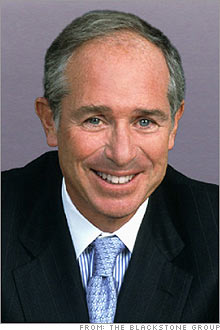Buying into BlackstoneThe biggest U.S. IPO this year is expected to make a dazzling debut, but investors in the private equity firm face risks, uncertainty over taxes.LONDON (CNNMoney.com) -- Blackstone Group, one of the biggest players in the recent boom of taking companies private, is itself set to go public soon - opening the door to the hottest game on Wall Street to everyday investors. Blackstone aims to raise as much as $4.75 billion when it goes public, which would make it the biggest U.S. IPO in five years. Originally scheduled for next week, the offering has been moved up on the calendar - a sign the deal is in good shape - and could start trading as early as Friday.
"Blackstone is the pre-eminent name in private equity funds. It's a trailblazer in many ways and every institution will want a piece of this," said David Menlow, president of IPOfinancial.com, an independent research firm. When Blackstone shares start trading, under the symbol BX on the New York Stock Exchange, retail investors will also have a chance to buy into the management company of Blackstone, which has raked in massive fees and profits by engineering some of the biggest deals in the buyout boom. It made headlines when it paid $38.9 billion for Equity Office Partners in February - at the time the largest private equity buyout ever. But Blackstone is going public at the same time that lawmakers are taking an unprecedented interest in private equity firms, and big players like New York-based Blackstone could feel the brunt of the crackdown. Blackstone plans to sell 12.5 percent of the company, with shares expected to price in a range of $29 to $31 a share. At the high end of the estimated range, the whole company would be valued at about $33.6 billion - bigger than Bear Stearns (Charts, Fortune 500). Loose lending conditions and the wide availability of cheap debt have created some of the most favorable conditions for buyout firms in years - helping spur an explosion in deals. Private equity firms buy companies with mostly borrowed money and restructure or overhaul them. Then they take the businesses public or sell them to other buyers, often raking in big profits. Blackstone has done particularly well in the business. Its CEO, Stephen Schwarzman, whom Fortune crowned "The New King of Wall Street" earlier this year, took home nearly $400 million last year, while co-founder Peter Peterson received $213 million. The firm, which has a reputation for being the savviest dealmaker around, has also netted huge returns for big investors like pension funds and endowments that buy into its funds. Blackstone's private equity funds have earned a 30.8 percent annual return since their inception in 1987, according to the firm's prospectus. But a bill recently introduced in Congress that aims to raise taxes on publicly traded private equity firms could hurt Blackstone's profitability down the line. The measure introduced by last week by ranking members of the Senate Finance Committee wouldn't apply to Blackstone for five years, but it's still causing some wariness among investors. "We're really in a period where we need to take step back and wait to see what happens. There are a lot of unknowns at this point. We don't know how the tax issue is going to play out, which could potentially have a significant impact on [Blackstone's] profits," said Russ Lundeberg, chief investment officer of Barrett Capital Management. Congress also is casting its eye on carried interest - the 20 percent cut managers take when their funds make a profit. Such a measure would affect all private equity firms - not just those that go public - and could cast a pall on the buyout boom at a time when industry watchers are already concerned about market conditions worsening. "The holy grail in private equity investment is carried interest," said David Scherl, managing partner at law firm Morrison Cohen who represents buyout funds. Carried interest is currently taxed at a long-term capital gains rate of 15 percent, but any moves to take away that incentive will discourage investment by private equity firms, he said. Aside from tax concerns, investors may find it difficult to stomach the volatile earnings that financial firms like Blackstone tend to generate, said Lundeberg, who manages portfolios for wealthy investors. Nonetheless, the unpredictable nature of alternative investments didn't stop investors from flocking to hedge fund Fortress when it went public in February. Fortress (Charts) shares skyrocketed from their offering price of $18.50 a share on their first day of trading to $31 a share but have since come down to trade at about $26 a share. Retail investors eager to get in on a piece of the private equity pie may have limited opportunities ahead. If the recently introduced tax bill becomes law, then it would likely put a chill on public offerings of buyout firms, experts say. "Ironically, Congress may have handed Blackstone a huge competitive advantage," said Joel Greenberg, partner and co-chair of of the corporate practice at law firm Kaye Scholer. (Correction: An earlier version of this story incorrectly listed Blackstone's trading symbol. We regret the error.) |
|

